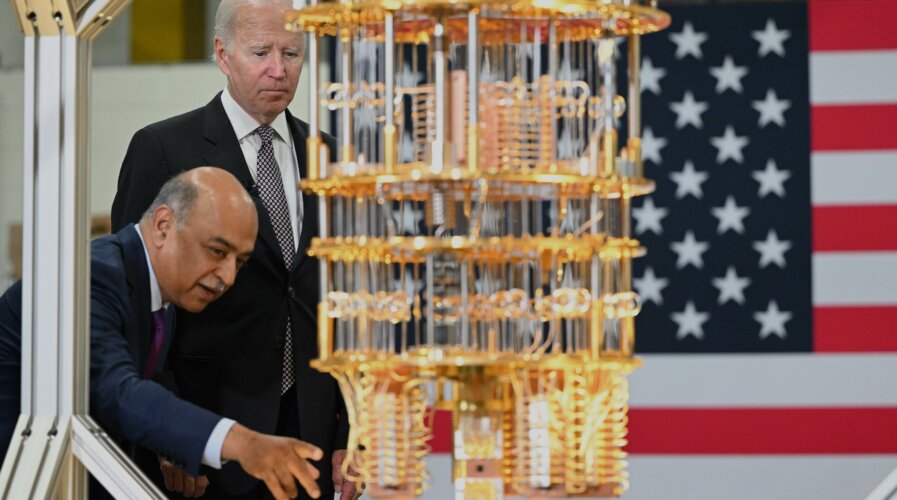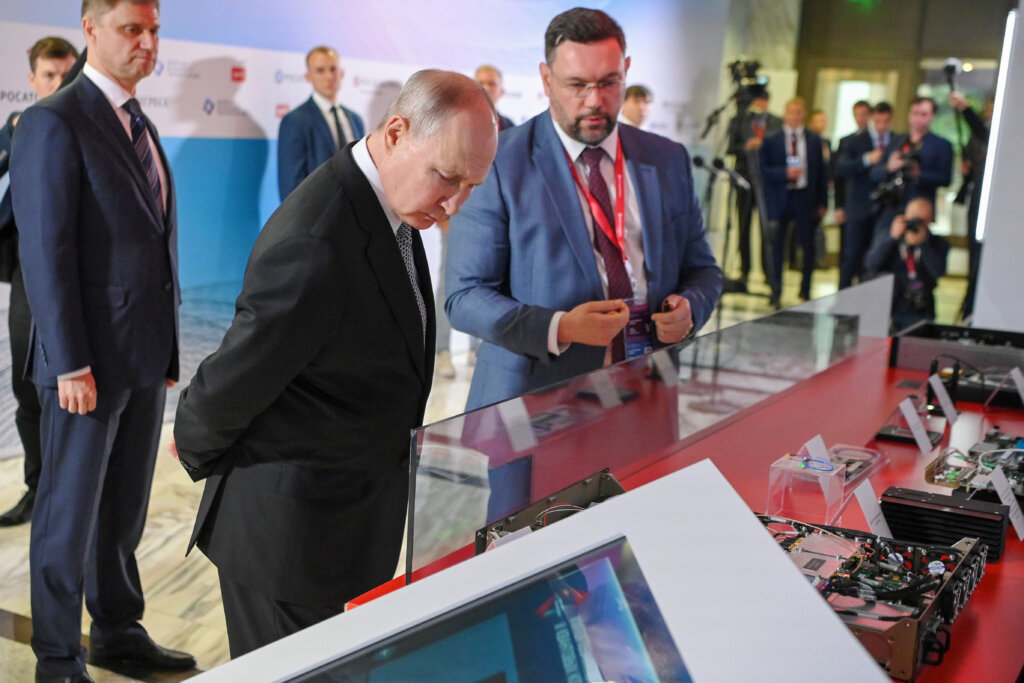
US President Joe Biden looks at a quantum computer with IBM CEO Arvind Krishna as he tours the IBM facility in Poughkeepsie, New York on October 6, 2022. – Last year, IBM’s CEO Arvind Krishna announced a US$20-billion investment in quantum computing, semiconductor manufacturing and other high-tech areas in its New York state facilities. (Photo by MANDEL NGAN / AFP)
Should the US be concerned about Asia’s quantum technology development?
The race for supremacy in quantum technology is picking up the pace. While initially China and the US were in a league of their own, more countries around the world are beginning to catch up with them, especially in research and developing use cases for quantum technology.
Quantum technology is basically the use of technologies that rely on quantum mechanics such as quantum entanglement, quantum superposition and quantum tunneling. Quantum computers, which is what most countries are focusing on is a computer that exploits quantum mechanical phenomena.
IBM, which is one of the leading companies in quantum technology research, defines quantum computing as “a rapidly-emerging technology that harnesses the laws of quantum mechanics to solve problems too complex for classical computers.” Currently, IBM Quantum leads the world in quantum computing hardware and software.
The tech giant introduced the Qiskit quantum SDK – an open-source, Python-based, and by far the most widely-used quantum SDK in the world. It’s useful for executions both on IBM’s fleet of superconducting quantum computers and on systems that use alternative technologies like ions trapped in magnetic fields.
Globally, several universities are working with IBM on quantum technology research. In Asia, the research is somehow expanding at a much faster rate. For example, in Japan, IBM recently announced a 10-year, US$100 million initiative with the University of Tokyo and the University of Chicago to develop a quantum-centric supercomputer powered by 100,000 qubits.
But IBM isn’t the only tech company making headlines in quantum technology in Japan. A consortium of joint research partners including Riken, the National Institute of Advanced Industrial Science and Technology (AIST), the National Institute of Information and Communications Technology (NICT), Osaka University, Fujitsu Limited and Nippon Telegraph and Telephone Corporation (NTT) announced the successful development of Japan’s first superconducting quantum computer in March this year. The partners are providing the newly developed technology to users in Japan as a cloud service for non-commercial use under a joint research agreement with Riken.
In fact, Japan’s Riken research institute aims to bring quantum computing technology into real-world use by around 2025. Riken will also work with an alliance of companies including Toyota Motor, Hitachi, and Sony Group to promote the use of computing infrastructure that melds quantum technology with supercomputers.

A Tweet on quantum computer design.
Quantum Technology in China
When it comes to quantum technology in Asia, China is definitely way ahead in terms of quantum research and use cases. Their domination in technology continues to be a concern for the US, who no doubt will look at every opportunity to slow down China’s growth in the field.
According to a report by SCMP, scientists in China claim they have reached another milestone in quantum computing, declaring their device Jiuzhang can perform tasks commonly used in artificial intelligence 180 million times faster than the world’s most powerful supercomputer. Jiuzhang is China’s first photonic quantum computer to claim quantum supremacy.
Despite this, China’s newest quantum computer, Wukong, was initially reported to be launched in July, but there has not been an official announcement on it yet. At the same time, Zhang Hui, general manager of Origin Quantum Computing Technology said that the new machine won’t be anywhere near the world’s fastest.
Part of the delay in the launch and slowdown in development is because of the need for foreign equipment such as election-beam lithography to make the superconducting chips.

China is having trouble getting the right materials to built their quantum computers. (Photo by Ludovic MARIN / AFP)
India and Southeast Asia’s quantum technology ambition
India is also doing its part to make sure it’s part of the technology race. The Indian government has signed off a US$730 million plan to make the nation a quantum computing and communications power by the year 2031. The initiative will be driven by the National Quantum mission, which aims to deliver scale quantum computers within eight years.
The private sector in India is also giving its support to the government’s initiative. Infosys, which is one of India’s largest tech companies, has launched the Infosys Quantum Living Labs for its customers that are interested in exploring quantum computing use cases.
In Southeast Asia, Singapore is no doubt the only country that is currently leading the quantum computing field. Most recently, Singapore unveiled the National Quantum-Safe Network Plus (NQSN+), an initiative aimed at establishing quantum-safe communications throughout Singapore and accelerating progress in the region.
Singapore also established the National Quantum Computing Hub, a joint initiative of the Center for Quantum Technology at the National University of Singapore, the Institute for High-Performance Computing (IHPC) at the Agency for Science Technology and Research, and the National Supercomputing Center Singapore.
Meanwhile, Horizon Quantum Computing is a Singapore-based company building software-development tools to enable the next revolution in quantum computing. The company, founded in 2018, created a programming language called Helium for quantum computers, designed to make it easier to tackle complex problems. The company recently picked up US$18.1 million in a Series A round from Tencent along with other investors.

Not left out of Quantum Technology – Russia’s President Vladimir Putin visits an exhibition of advanced developments in the field of quantum technologies of the state corporation Rosatom and Russian Railways during the Future Technologies Forum in Moscow on July 13, 2023. (Photo by Alexander Kazakov / AFP)
An open race?
With half of Asia seemingly making the right investments in quantum computing, and European nations also heavily involved with research and development in the field, should the US be worried about having to play catch up with them?
Fortunately, the US doesn’t really have to be worried. There are a few reasons for this. First, quantum computing researchers do not see research in technology as a competition. In fact, most of them share their findings so that more use cases can be developed.
Secondly, the US is already taking the first step in quantum technology dominance through the implementation of the Post-Quantum Cryptography (PQC) initiative. The Infrastructure and Cybersecurity Agency (CISA)’s PQC initiative will unify and drive efforts with interagency and industry partners to address threats posed by quantum computing and to support critical infrastructure and government network owners and operators during the transition to post-quantum cryptography.
The National Institute of Standards and Technology (NIST) has also announced that a new post-quantum cryptographic standard will replace current public-key cryptography, which is vulnerable to quantum-based attacks.
Finally, the US is working with several countries including Japan, Australia and others in the development of the technology. These allies in quantum technology may just ensure that everyone is moving at the same pace in the race for quantum supremacy.
READ MORE
- The threat of fraud networks in the APAC: KYC and beyond
- Next-gen CX is based on customer communication management systems.
- Enhancing Business Agility with SASE: Insights for CIOs in APAC
- 3 Steps to Successfully Automate Copilot for Microsoft 365 Implementation
- Trustworthy AI – the Promise of Enterprise-Friendly Generative Machine Learning with Dell and NVIDIA


